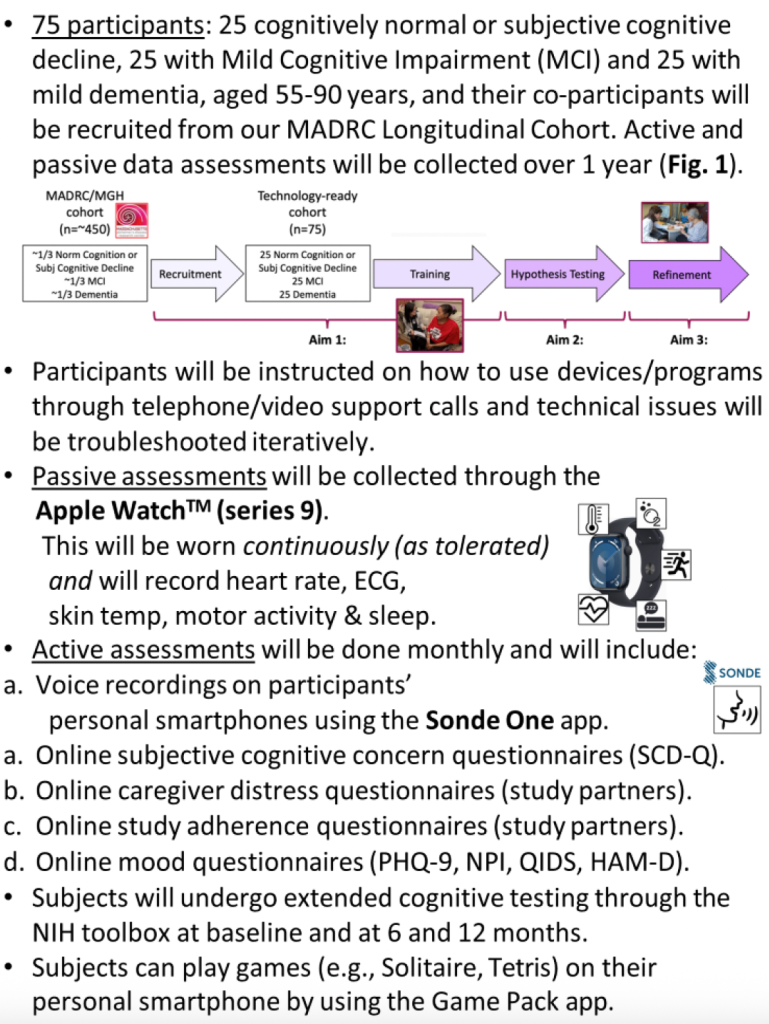Investigator:
Mark Eldaief, Massachusetts General Hospital
MassAITC Cohort: Year 2 (AD/ADRD)

Project Accomplishments: The pilot project led by Dr. Mark Eldaief successfully established a technology‑ready cohort of older adults, individuals with Alzheimer’s disease and related dementias (ADRD), and their caregivers. The team partnered with Amissa™ Health to support continuous cloud‑based data collection from Apple Watches, capturing metrics such as motion, sleep stages, heart‑rate variability, oxygen saturation, and skin temperature. Participants also used the GamePack™ platform to generate cognitive performance data through gameplay. Recruitment exceeded expectations, enrolling 83 participants across cognitive status groups, with strong retention—only 5% withdrew—and most participants still actively contributing data.
The study’s aims focused on enabling long‑term digital assessment, predicting cognitive and behavioral decline, and evaluating engagement and barriers to technology adoption. While full data analysis is ongoing due to the longitudinal nature of the study, early results demonstrate high compliance with wearable‑based monitoring. The project has already catalyzed further scientific progress: the PI leveraged this work to secure an NIH R21 award to investigate autonomic dysfunction in frontotemporal dementia using wearable technologies.
Initial Proposal Abstract: Traditionally, Alzheimer’s Disease and related dementias (ADRD) patients are evaluated infrequently, imprecisely, and in artificial settings. This creates significant barriers to monitoring disease progression and caregiver burden in ADRD, and to assessing the impact of clinical and investigational interventions.
Digital assessment measures— including digital phenotyping, artificial intelligence (AI) assessments and machine learning algorithms— can provide more reliable, more naturalistic (i.e., in a patient’s home environment) and more frequent (e.g., continuous) measurements in ADRD patients than those used in clinical settings. These assessments may also monitor safety more accurately, assure medication adherence, and facilitate communication with a patient’s medical team. Moreover, because of the enhanced sensitivity of these measures, they may better predict conversion to dementia in preclinical individuals. However, there are barriers to implementing these digital technologies. These include understanding which technologies can be most readily used in older— and not necessarily tech-savvy— populations, understanding the barriers to the adoption of these technologies in these populations, and confirming that these technologies provide tractable and predictive data regarding cognitive and behavioral disease progression.
To address these issues, this project will create and train a “technology-ready cohort” upon which digital assessments relevant to ADRD patients and their caregivers can be tested. Next, we will show that these assessments better predict key cognitive and behavioral outcome measures in ADRD than standard clinical or research visits. In parallel, we will iteratively evaluate and address barriers to the adoption of these technologies in these populations.
Outcomes:
- Grant Funding: R21 AG088872
 Title: Characterizing autonomic impairments in Frontotemporal Dementia This R21 builds upon the tech ready cohort that was established by the pilot project funding. Public Health Relevance Statement: This proposal will test the accuracy and reliability of autonomic measurements in bvFTD patients. Measurements will be collected both with established equipment and… Read more: Grant Funding: R21 AG088872
Title: Characterizing autonomic impairments in Frontotemporal Dementia This R21 builds upon the tech ready cohort that was established by the pilot project funding. Public Health Relevance Statement: This proposal will test the accuracy and reliability of autonomic measurements in bvFTD patients. Measurements will be collected both with established equipment and… Read more: Grant Funding: R21 AG088872 - Poster Presentation: a2 National Symposium 2024
 Title: Creation of a Technology-Ready Cohort of Patients with Alzheimer’s Disease and Related Dementias and Their Caregivers Authors: Mark Eldaief, Beata-Gabriela Simpson, Sudeshna Das
Title: Creation of a Technology-Ready Cohort of Patients with Alzheimer’s Disease and Related Dementias and Their Caregivers Authors: Mark Eldaief, Beata-Gabriela Simpson, Sudeshna Das
